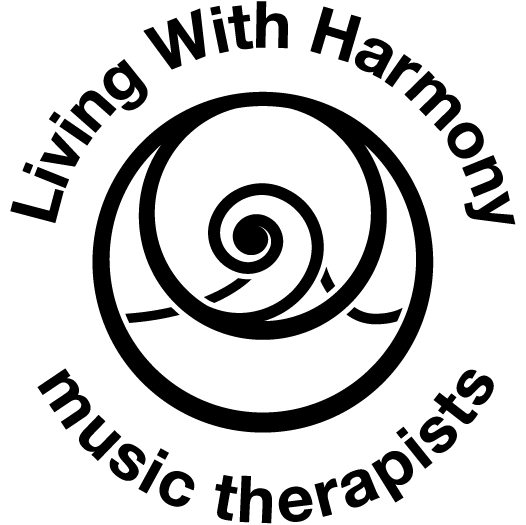Group Music Therapy and People with Autism
Autism (ASD) is frequently defined by impairments: difficulties in social engagement, communication, imagination and creativity. What would it be like if we were all defined by our abilities? Living with Harmony music therapists have found that coming to the schools or homes where people live, where they are secure and familiar in their surroundings, brings huge rewards. Real life settings are both more unpredictable than a private therapy room yet also more familiar. Children and adults alike are more at ease when they have teachers or support staff around that know them which maximises the enabling role of the music therapists. In familiar surroundings people with Autism are more relaxed and can most easily access their abilities for musical communication and relating to others through shared music making. Our clients in group homes deepen their relationships with others through participating in their own time and in their own way in community group music therapy. Emotional flexibility and potential for peer interaction are the most important outcomes of this approach. In school settings young children thrive on the motivation their peers offer and school leavers have the chance to take responsibility for their relationships in an emotionally educational musical context.
Group Work with Alistair and Meta
We take the views of others very seriously! From a home we were working at for young people with Autism and learning difficulties in 2014 we got the following great responses from the support staff:
- 100% of staff responding thought that the community group music therapy had achieved its aim of developing wellbeing and mutual understanding.
- The staff rated the experience as 92% effective
- The staff rated the experience as 85% motivational
The feedback form also encouraged staff to give their personal opinions (below). Our experience was staff grew to accept and understand the purpose of the sessions and that this had a direct and positive impact on the clients. The staff participating also appeared to find it enjoyable, to have fun and to witness the service users being engaged and interacting.
This is a sample of what they said:
“It really benefited the service. Service users and staff built confidence and social interest”
“It has been very entertaining having you people every now and then”
“Thank you for the music, service users and staff will miss our session”
“The best bit was service users’ motivation and getting used to the different aspects of life in the music group”
“I enjoyed seeing the service users participating well”
“It was very good for service users and staff”
“All the service users enjoyed it and seemed able to express themselves through the instruments”
“It was light and fun”
“It allowed the service users to channel their emotions”
“The service users participated actively and showed a lot of enthusiasm”
The Service
Traditionally, the main reason an adult may be offered music therapy would be to address the mental health needs of an individual on the autistic spectrum. Children benefit from music therapy to support language development and to enable emotional growth which is key to learning. Anxiety and extreme difficulties in relating to others are typical presentations in adults and children on the autistic spectrum. Unusually, we are able to offer socially inclusive group work to these clients through working with staff and residents in co-creative community group music therapy. This work addresses the issues and mediates the difficulties of the individual but also grows their confidence and abilities within an inclusive real world context. Because we work with staff, the benefits can generalise and sustain.
Living with Harmony music therapists, Alistair Clarkson and Meta Killick are both HCPC registered and fully insured so you can be confident in the standards of the service. We have unique experience and expertise in offering group work for people on the autistic spectrum and their carers.
References can be found here.

